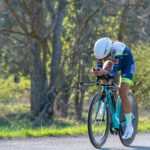Of course, I’m not talking about just any old 8th place finish in a ski race. After four previous World Cup starts in which she didn’t qualify for the second run, 16-year-old Mikaela Shiffrin broke through with an impressive top-10 finish (starting 37th) at the World Cup slalom in Aspen recently.
Though Mikaela’s result was impressive (though not unexpected), her interview after the race was equally notable for the lessons that every young ski racer (and people in general) can garner from it. Let me share with you the lessons I took away from her thoughtful and enthusiastic review.
1. Have fun. Mikaela may be the latest wunderkind of alpine ski racing and competing under the microscope of the World Cup, but it’s clear from her interview that she is having some big fun out there. If you’re having fun, you’re going to be confident, relaxed, and focused, and you’re likely going to ski your best. Just like Mikaela.
2. It’s about the process, not the outcome. One thing I noticed about the interview was that Mikaela didn’t focus on her result, but talked about the process of the race: how she skied, how she felt before and during her race, what she did well, and what she didn’t do well. The result, however outstanding it was, seemed almost incidental. Also, Mikaela said that her performance “exceeded my expectations if I had any,” which means that she didn’t have any. She understands that outcome expectations, that is, focusing on results, are the kiss of death to ski racers. Outcome expectations, ironically, will prevent you from getting the results you want because they distract you from the process of skiing your best and create pressure to live up to those expectations.
3. Even the best get nervous. The first thing that Mikaela mentions in her interview is that she was nervous before her race. She said that the pressure didn’t come from her coaches or her mother. Knowing Mikaela, my guess is that the bout of nerves came from the goals she sets for herself. There is a big difference because racers can’t control—and are often feel threatened by—external pressure, but self-imposed pressure can be harnessed and directed into positive energy, as evidenced by Mikaela
4. Even the best have doubts. That’s hard to believe given the kind of skier she is. But recognize that she’s new to this level of competition and it’s nearly impossible for her to not compare herself to the other more experienced racers. The lesson here is that some doubts are natural, especially for young racers, so you shouldn’t freak out about them, but rather accept them as part of the deal and refocus on positive things.
5. Even the best need support. Clearly, Mikaela’s coaches and mother were positive and supportive presences for her, providing a healthy and calming perspective when she was nervous and uncertain. That’s a good lesson and reminder for all coaches and parents: young racers don’t need more pressure placed on them, rather they need help lifting the pressure they feel.
6. Confidence is essential. Mikaela said that if she didn’t believe in herself, she might as well not even race. She realizes that, after all the training that goes into preparing for race day, if you don’t believe you can achieve your goals, you probably won’t. Ultimately, she went back to her meticulous preparations and, even with moments of doubt, had a fundamental faith in her ability.
7. Always look for ways to ski faster. Though this was a breakthrough performance that she was clearly thrilled about, Mikaela is already looking for ways to “keep it going” and ski better and faster. This thinking is one of the more remarkable aspects of Mikaela that I’ve observed while watching her train several times at Burke. Even after truly amazing training runs, the first thing she asks of her coaches and herself is “What can I do next run to go faster?”
8. Have a long-term perspective, but focus on the present. Mikaela understands that ski racing is a marathon, not a sprint, and that she still has a ways to go before she gets to the top. At the same time, she also appreciates that she has to take one step at a time and that, though this race was a big step, it was also just one step in a long climb to the top.
9. Stay grounded. Mikaela said that she would “try not to think about” the result, just “try my best to keep moving forward.” It would be so easy for a 16 year old who just finished in the top ten of a World Cup to get swept away by the result and the attention. But Mikaela’s preternatural maturity shines through and, as I like to say, she “keeps her head on the ground and her feet in the air.”
10. Feel the joy. Mikaela’s interview concludes with “I’m really excited.” You can just feel her exhilaration in the experience gushing forth by the huge smile on her face (she looks like her face is going to burst!) and the happy tone of her voice. Perhaps the most important lesson we can learn from Mikaela is that, results aside, the reason to ski race is for the fun and the joy.






